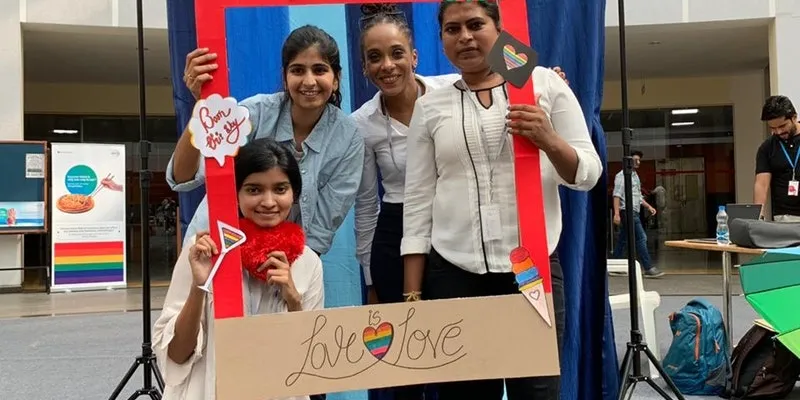Transforming lives: How Chennai startup PeriFerry is helping the transgender community find employment
In India, most transgender people are denied employment and are unable to participate in the country's economic activities. Chennai-based startup PeriFerry hopes to bring a change in this scenario.
According to a 2018 study by the National Human Rights Commission of India (NHRCI), 15 percent of the transgender community across Delhi-NCR and Uttar Pradesh remain unemployed. And among the employed transgender population, the levels of income were found to be "abysmally low" and are "denied the right to have a decent standard of living."
While the study covers a small fraction of India's transgender demographic, the situation is similar across the country.
Aiming to improve the existing scenario, Chennai-based startup PeriFerry, is facilitating change and equal employment opportunities for the transgender community.
1561440138494.png?fm=png&auto=format)
The PeriFerry team
Creating the ripple
PeriFerry was founded in May 2017 by former Goldman Sachs employee Neelam Jain. Neelam, who has always been passionate about helping the LGBTQIA+ community, initially came up with the idea for PeriFerry during her two-year stint at Goldman Sachs. She says her family's background in business, combined with her drive to help the community, has played a huge role in the foundation of PeriFerry.
1561442039712.png?fm=png&auto=format)
Neelam Jain, Founder, PeriFerry
Neelam also says that she decided to launch PeriFerry because she realised that although there were a few organisations for the LGBTQIA+ community, none were actively working towards truly uplifting their socio-economic conditions.
Turning the tide
Founded in 2017 by Neelam Jain, PeriFerry is a socially inclusive startup that helps place trans people in organisations that offer them sustainable jobs. It also offers free training to the candidates, across various skills like communication in English, computer fundamentals, and etiquette, and grooming.
"A large portion of the Indian trans community depends upon begging and/or sex work to earn their daily livings. Steady mainstream livelihoods hold the key to change this picture and only accessible education, non-discriminating employment opportunities can grant access to that key," says Neelam.
So far, Periferry has helped find employment for over 85 transgender people at small and large companies of both Indian and foreign origin. The organisation's mission doesn't end there. It conducts sensitisation workshops at the employer's premises to facilitate a safer and more inclusive workforce, and conducts routine follow-ups for at least six months to ensure employee and employer satisfaction.
“We consult with our partner clients for identifying suitable job openings, and since our client base includes organisations from nearly every corner of the financial landscape, there is a wide variety of job roles,” Neelam adds.
Through PeriFerry, candidates are able to work in fields like software, HR, graphic design, accountancy, tech support, hospitality, food delivery, and makeup.

Neelam with a few members of PeriFerry
The grassroots challenge
PeriFerry connects with the transgender community through field visits, social media, referrals, direct contacts through its website, and online forums. However, since a large number of transgender individuals in India live in communal spaces, helping them understand PeriFerry's mission poses a challenge.
Neelam says that the main challenge is convincing community members to pursue the mainstream opportunities it provides.
"Due to social stigma and also the ironically closeted environment within the Hijra community, a majority of the members are under the impression that engaging in sex work and/or begging is the only way for a transgender person to earn their living. It takes a lot of effort and time from our end to successfully convey to the members the available alternative livelihoods but we are hopeful of lesser friction as the society moves forward," explains Neelam.
Workplace sensitisation
PeriFerry conducts year-round gender sensitisation workshops at the workplaces where its trans candidates are employed, which are designed for further inclusion and empathy.
The workshops include experience zones, which serve as ice-breakers that encourage participation in sensitive conversations around sex and gender. PeriFerry uses the “Genderbread” mascot to help its audience understand the different facets of sex, gender identity, and gender expression.
"We provide guidelines on the best practices of LGBTQIA+ inclusion and also host Q&A sessions to help ease any confusion in a safe and welcoming manner. Already established transgender professionals also share their journeys in our sensitisation workshops providing first hand insights," Neelam explains.
Other sensitisation activities include field visits to community shelters and case studies that facilitate direct learning. "We have also recently started to educate the society on transgender identities and issues through theatre arts," Neelam adds.
Inclusive workplace 101
Neelam says that there are certain things that companies must keep in mind, when making the transition to being a diverse and inclusive workplace and recruiting from the trans community. Some of these are:
- Ensuring a bias-free interview process
- Enacting clear anti-discriminatory, anti-harassment policies and showing zero tolerance towards violations.
- Sensitising staff at every level.
- Letting employees use restrooms of their choice and additionally providing gender neutral restrooms or transgender restrooms but not force their usage.
- Allowing employees to dress in accordance with their gender identity and expression.
- Using gender-neutral language words like ‘employee’ or ‘person’ and gender neutral pronouns like ‘they’, ‘them’ and ‘their’ unless specified by the individual. If an individual has specifically mentioned pronouns that they want to use then it is recommended to respect and use those pronouns.
- Establishing a culture within the company to use legal name for official records and the preferred name for everything else.
- Posting job descriptions in a gender-neutral way.
- Not forcing or asking for proof of transition related surgeries or hormone replacement therapy (HRT) process.
- Working towards establishing a corporate health insurance plan that covers the medical expenses concerning transition, which again, shouldn’t be forced, since not all transgender persons may want to medically transition.
Making waves
Over the past two years, PeriFerry has seen a retention rate of over 90 percent, and among the many who have found sustainable jobs through PeriFerry, a few successful candidates are:
Bharaa Bobby, the project coordinator of the Experience Team at SPI Cinemas, Anusha Caleb, a Wealth Operations Analyst at Australia and New Zealand Bank, Sumangali Balakrishnan a front office executive at The Bohemian House, and Ramesh Kumar, a hair stylist at Naturals Spa and Salon.

(L-R) Bharaa Bobby, Ramesh Kumar, Sumangali Balakrishnan, Anusha Caleb
Going forward, PeriFerry aims to help more trans people find secure jobs, and help more workplaces shift towards being more diverse and inclusive.










